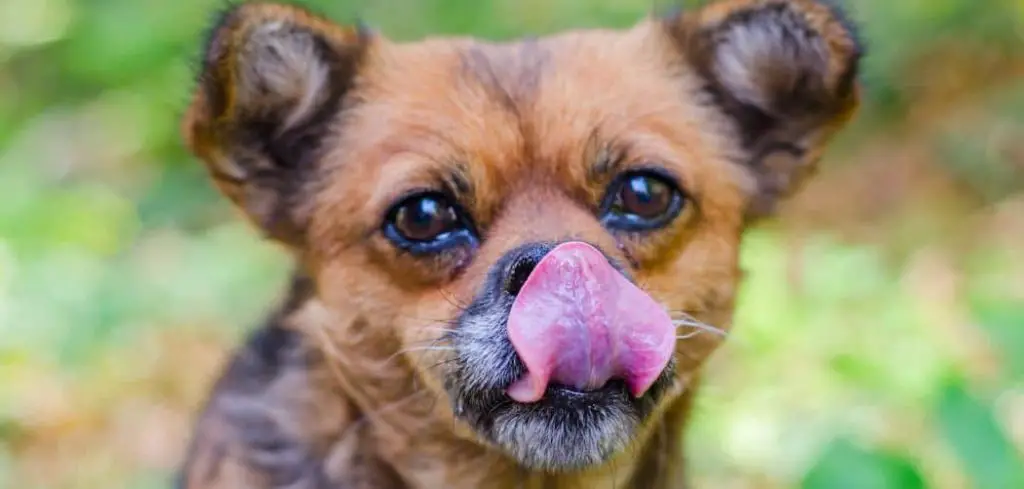Panting and excessive mouth watering in dogs can be concerning for any dog owner. While some drooling and panting is normal, especially after exercise or excitement, persistent symptoms may signal underlying health issues.
We outline the common causes of panting and excessive mouth watering in dogs, what you can do at home, and when to seek veterinary help.
Dog Panting and Mouth Watering — Why It Happens
A dog panting with excessive drooling or watery saliva often points to nausea, dental problems, or toxin ingestion. Overheating can also trigger drooling alongside panting.
While mild cases may just be motion sickness or a sour stomach, sudden or severe drooling with panting can be an emergency, especially if poisoning or heatstroke is suspected.

Dog Panting and Mouth Watering: Common Causes
Heatstroke or Overheating
Heatstroke is a leading cause of panting and drooling in dogs. Dogs regulate their body temperature through panting, and excessive heat can trigger profuse drooling as the body attempts to cool down.
Signs include heavy, rapid panting, red or pale gums, weakness, and restlessness. Certain breeds, especially brachycephalic dogs like pugs or bulldogs, are more prone to heat-related stress. Immediate cooling and veterinary attention are critical to prevent organ damage.
Read more: Dog Panting and Drooling at Night (What nighttime drooling may indicate)
Nausea or Digestive Upset
Nausea often leads to panting and excessive salivation. Dogs may drool and pant as a natural response to queasiness caused by gastrointestinal upset, ingestion of spoiled food, or sudden dietary changes.
You may notice other symptoms like vomiting, decreased appetite, diarrhea, or lethargy.
Dogs often lick their lips or swallow frequently to manage nausea, and repeated nighttime episodes can be particularly concerning.
Oral or Dental Problems
Dental issues are a common source of drooling and panting. Pain from inflamed gums, infected teeth, oral lesions, or foreign objects in the mouth can lead dogs to salivate excessively and pant from discomfort.
Look for signs such as bad breath, pawing at the mouth, difficulty chewing, or swelling. Left untreated, dental problems can worsen systemic health, including heart and kidney complications.
Poisoning or Toxic Ingestion
Panting and drooling may indicate exposure to toxic substances. Dogs that ingest harmful plants, chemicals, human medications, or spoiled food can exhibit sudden excessive salivation and rapid breathing.
Additional symptoms include vomiting, diarrhea, lethargy, tremors, or disorientation. Poisoning is a veterinary emergency and requires immediate intervention to prevent serious complications or death.
Respiratory or Cardiac Issues
Respiratory and heart conditions can cause panting and mouth watering. Difficulty breathing, heart murmurs, or congestive heart failure may trigger rapid panting, while stress or nausea from low oxygen levels can increase drooling.
Other indicators include coughing, labored breathing, exercise intolerance, or restlessness. Timely veterinary evaluation is essential to manage these potentially life-threatening conditions.
Anxiety or Stress
Emotional distress can manifest as panting and excessive drooling. Dogs experiencing separation anxiety, fear of loud noises, or changes in their environment may pant heavily and salivate as a stress response.
Behavioral signs such as pacing, whining, trembling, or restless sleep often accompany these physical symptoms.
Addressing triggers and providing calming interventions can improve your dog’s comfort and reduce stress-induced panting.
What to Do If Your Dog Is Panting and Mouth Watering
Ensure your dog is cool and hydrated, particularly if overheating is suspected. Provide a quiet, comfortable space and avoid exposure to extreme temperatures.
Monitor eating habits and environment. Avoid giving new foods suddenly and remove access to toxic substances. Observe for patterns in drooling and panting to help identify potential triggers.
Address oral discomfort. Check for visible dental problems or foreign objects in the mouth. If pain is suspected, schedule a dental examination with your veterinarian.
Support digestive health. Provide small, easily digestible meals and monitor for nausea or vomiting. Keeping a food diary can help identify intolerances or sensitivities.
Manage stress and anxiety. Gentle interaction, environmental enrichment, or calming aids such as pheromone diffusers may reduce stress-induced panting and drooling. Consistent routines can also help reduce nighttime episodes.
When to Call or Visit Your Vet
Seek veterinary attention immediately if your dog shows:
Persistent or worsening panting and drooling without an obvious trigger
Signs of pain, oral discomfort, or foreign body ingestion
Vomiting, diarrhea, lethargy, or weakness
Labored breathing, coughing, or rapid heartbeat
Sudden behavioral changes, disorientation, or tremors
Prompt evaluation can prevent serious complications and ensure your dog receives appropriate treatment for any underlying condition.
Read more: Dog panting excessively (Here’s Why)
Key Takeaway
Excessive panting and mouth watering in dogs may stem from stress, overheating, digestive upset, dental problems, or serious medical conditions.
By observing your dog’s behavior, ensuring a comfortable environment, addressing potential pain or discomfort, and consulting a veterinarian when necessary, you can help keep your dog safe and healthy.
Prompt attention to these signs is essential for both short-term relief and long-term wellbeing.
